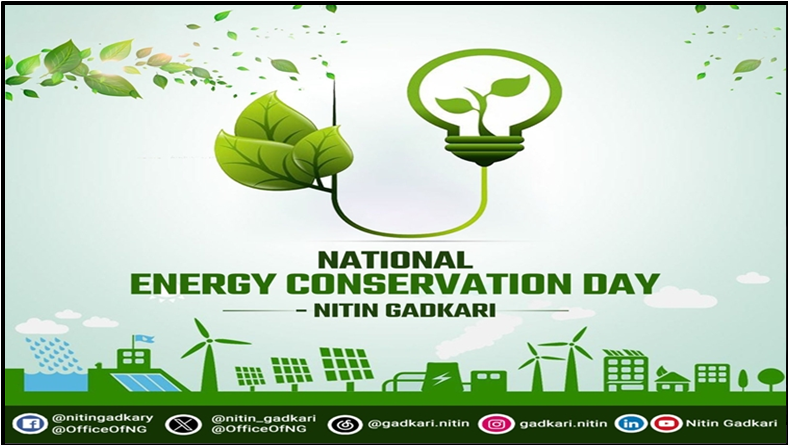National Energy Conservation Day
News
- Every year on December 14, we celebrate National Energy Conservation Day, which aims to raise awareness of the value of energy conservation and highlight the country’s accomplishments in these areas.
- Union Minister of Road Transport and Highways has urged the public to be mindful of their choices for a better future on this National Energy Conservation Day.
- NOTE: The Energy Conservation (Amendment) Bill, which was passed by the Parliament in 2022, cleared the way for India to impose mandatory use of non-fossil fuels, such as green hydrogen, green ammonia, biomass, and ethanol, as well as to create carbon markets within the nation.
What is energy conservation?
- Energy conservation is the process of making sure that energy is used as efficiently as possible and hence India celebrates December 14 as National Energy Conservation Day for remembering the same.
- The energy conservation can be achieved by either using less energy for a specific constant purpose (turning off lights and fans when not in use) or by using less energy for a specific service (driving less and using public transportation instead).
- Energy efficiency at the macro level is the result of deliberate individual energy conservation. The ultimate aim of energy conservation is to aim for sustainable energy.
Need of energy conservation?
- Energy is fundamental to this transitional era in which the world finds itself.
- Since 2000, India has contributed nearly 10% of the rise in the world’s energy consumption. Over this time, India’s energy consumption has nearly doubled, increasing its share of the world market from 4.4% at the start of the century to 5.7% in 2013.
- India’s primary energy demand increased from approximately 441 million mega tonnes of oil equivalent in 2000 to approximately 775 million MTOE in 2013.
- According to estimates from the International Energy Agency (IEA) and the Integrated Energy Policy Report, this demand will rise from roughly 1250 million to 1500 million toe by 2030.
| International Energy Agency (IEA)
● It is a self-governing intergovernmental organization operating within the OECD framework. ● It collaborates with businesses and governments to create a safe and sustainable energy future for everybody. ● Background of establishment: It was developed in reaction to the 1973–1974 oil crisis, in which the vulnerability of industrialized nations to reliance on oil imports was revealed by an oil embargo imposed by major producers, driving prices to all-time highs and hence It was established with the goal of securing oil supplies. ● There are eleven association countries and 31 member countries. ● An applicant for the International Energy Agency (IEA) must be an Organization for Economic Co-operation and Development (OECD) member nation. ● India became an Associate member of this organization in 2017. ● IEA reports: World Energy Outlook, World Energy Balances, Energy Technology Perspectives, World Energy Statistics and Net Zero by 2050. Organization for Economic Co-operation and Development (OECD) ● It is a global organization with 38 member nations that is dedicated to market economies and democracy; ● The OECD aspires to create policies that promote equality, opportunity, prosperity, and well-being for all. ● The OECD releases forecasts, statistical databases, analyses, and economic reports about the prospects for global economic growth. ● Along with eradicating financial crime globally, the organization also aims to eradicate bribery. ● A “black list” of countries that are regarded as uncooperative tax havens is kept up to date by the OECD. ● In addition to its member nations, the OECD maintains working relationships with numerous non-member economies, India included. ● Headquarter: Paris, France. ● The majority of OECD members are democratic nations that uphold free-market economies. ● On December 14, 1960, the US and Canada joined 18 European countries to form the OECD. |




